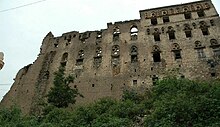world.wikisort.org - Yemen
Jiblah (Arabic: جِبْلَة) is a town in south-western Yemen, c. eight kilometres (5.0 mi) south, south-west of Ibb in the governorate of the same name. It is located at the elevation of around 2,200 metres (7,200 feet), near Jabal At-Taʿkar (جَبَل ٱلتَّعْكَر).[1][2] The town and its surroundings were added to the UNESCO World Heritage Tentative List due to its purported universal cultural value. The historical Palace of Queen Arwa is located in the town.[3]
Jibla
جِبْلَة | |
|---|---|
Town | |
 Jibla, with the Queen Arwa Mosque in the background | |
| Coordinates: 13°55′N 44°9′E | |
| Country | |
| Governorate | Ibb Governorate |
| District | Jibla |
| Time zone | UTC+3 (Yemen Standard Time) |
History

Following the assassination of the Sulayhid 'Ali ibn Muhammad in 1067 CE, Arwa al-Sulayhi's husband Ahmad became the de jure ruler of Yemen, but he was unable to rule, being paralysed and bedridden. He gave all of his power to Arwa, one of her first actions was to move the capital from Sana'a to Jibla, in order to be in a better position to destroy Sa'id ibn Najar, and thus avenge her father-in-law's death. This she managed to do by luring him into a trap in 1088. She built a new palace at Jibla, and transformed the old palace into a great mosque where she was eventually buried.[3][4][5][6]
Rural life of villagers
As late as 1979, the women of Jibla would launder their clothes in large pools formed by rivulets of natural spring water, which trickled down the slopes of Jebal Attaker. Stepping stones of the brook were used in place of scrub-boards.
Rest your heart among the little hills of Dhī l-Sufāl, gaze upon its expanses, / There the air is as clear as crystal, the water is pure, and night brings even greater happiness.[7]
Infrastructure
Hospital(s)
Located here is the American Baptist Hospital. It is where Taher Qassim (a public health practitioner and founder of the Liverpool Arab Arts Festival, who was born in the village of Al-Karaba) spent 3½ years in vocation.[8]
On December 30, 2002, an Islamist militant entered Jibla Baptist Hospital, and shot and killed three Southern Baptist hospital workers. The day after the shootings, ownership of the hospital was transferred to the Yemeni government. The government assumed responsibility in 2003, and continued to employ Southern Baptist workers, until its closing in May 2007.[9]
As with other areas in war-torn Yemen, Jiblah was affected by the COVID-19 pandemic, but its hospital lacked capabilities to test for the coronavirus, thus doctors there had to use other means to diagnose it. Yet according to two healthcare workers there, the hospital daily received almost 50 people with symptoms, and out of fear of reprisals, doctors did not inform relatives of deceased patients about them even being suspected to have contracted the virus.[10][11][12][13]
Mosques
| Qubbat Bayt Az-Zum Mosque | |
|---|---|
| |
 | |
| Religion | |
| Affiliation | Islam |
| Region | West Asia |
| Status | Active |
| Location | |
| Location | Jiblah, Yemen, South Arabia |
 Location in Yemen  Jibla, Yemen (Middle East)  Jibla, Yemen (Asia) | |
| Geographic coordinates | 13°55′23.33″N 44°8′52.68″E |
| Architecture | |
| Type | Mosque |
| Style | Islamic |
| Completed | 921 A.H.[15] |
| Specifications | |
| Dome(s) | 1 |
| Minaret(s) | 1 |
There are two historical mosques here:[3][16]
- That of Queen Arwa
- Qubbat Bayt Az-Zum Mosque (Arabic: مَسْجِد قُبَّة بَيْت ٱلْزُّوْم, romanized: Masjid Qubbat Bayt Az-Zūm), also known as Masjid Qubbat Ash-Shaykh Yaʿqūb Az-Zūm (مَسْجِد قُبَّة ٱلشَّيْخ يَعْقُوْب ٱلْزُّوْم),[14] which was established in 921 A.H.[15]
References
- "مناطق تاريخية (حصن التعكر..مصير مجهول ل6 آلاف سنة من تاريخه)". Almotamar Press (in Arabic). 2014-12-25. Retrieved 2021-08-19.
- سيف, إسلام (2018-03-12). "الحوثي يستحدث موقعا عسكريا بأعلى قمة جبلية وسط اليمن" (in Arabic). Yemen: Al Arabiya. Retrieved 2021-08-19.
- Jibla and its surroundings, UNESCO World Heritage Centre, retrieved 2009-04-20
- Muhammad Zakaria (1998) مساجد اليمن
- Mernissi, Fatima; Lakeland, Mary Jo (2003), The forgotten queens of Islam, Oxford University Press, ISBN 978-0-19-579868-5
- "Yemen" (PDF) (in Arabic). NIC.
- Aḥmad b. al-Ḥasan al-Jibli (d. 1880 / 1881)
- Maghribi, Layla (2021-08-06). "Arab arts champion Taher Qassim never forgets his remote Yemen roots: The leading public health practitioner and Liverpool Arab Arts Festival founder has gone far, but memories of his shepherd upbringing remain strong". The National. Retrieved 2021-08-16.
- Ranish, David (January 11, 2013). "Southern Baptist 32-year legacy lives on". Mission Network News. Retrieved September 22, 2016.
- Magdy, Sami (2021-08-13). "In Yemen's north, Houthis face virus with outright denial". AP News. Cairo, Egypt. Retrieved 2021-08-16.
- "In Yemen's north, Houthis face Coronavirus with outright denial". AP News. Cairo: Ahram Online. 2021-08-13. Retrieved 2021-08-16.
- "In Yemen's north, Houthis face virus with outright denial". AP News. Cairo: Arab News. 2021-08-13. Retrieved 2021-08-19.
- "In Yemen's north, Huthis face virus with outright denial". AP News. Cairo: Egypt Independent. 2021-08-13. Retrieved 2021-08-16.
- عميقة, فؤاد أحمد المليكي بشرى قاسم (2007-05-05). "جبلة.. تاريخ ملكة عظيمة، اسمها ينسب لأحد صانعي الفخار". Yemeress Al-Gomhoriah (in Arabic). Retrieved 2021-08-05.
- الحسني, أحمد (2005-01-17). "جبـــــــــــلة .. ثلاثية المرأة والأفيون والمآذن". Almotamar (in Arabic). Jiblah, Yemen. Retrieved 2021-08-19.
- "Jibla (Yemen)". Around the World in 80 Clicks. May 2004. Retrieved 2021-08-04.
External links
| Wikimedia Commons has media related to Jibla. |
- Ministry of Information of Yemen
- Travel Adventures
- Yémen : Ibb, Jibla (YouTube)
- Yemen Jibla market
- مسجد قبة الزوم بمدينة جبلة باليمن - دراسة أثرية وثائقية (Arabic)
Jabal At-Ta'kar
- جبل التعكر - اعلى جبل في اليمن
- جبل التعكر مدينة اب الخضراء
- جبل التعكر في وسط اليمن وعلاقته بسطيح الكاهن
Другой контент может иметь иную лицензию. Перед использованием материалов сайта WikiSort.org внимательно изучите правила лицензирования конкретных элементов наполнения сайта.
WikiSort.org - проект по пересортировке и дополнению контента Википедии



